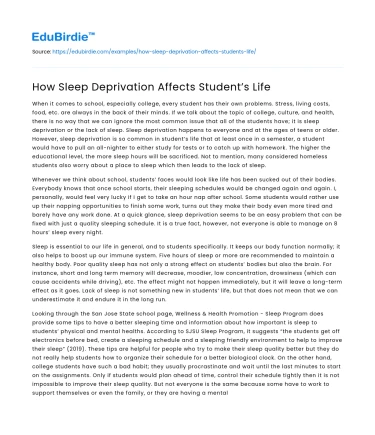When it comes to school, especially college, every student has their own problems. Stress, living costs, food, etc. are always in the back of their minds. If we talk about the topic of college, culture, and health, there is no way that we can ignore the most common issue that all of the students have; it is sleep deprivation or the lack of sleep. Sleep deprivation happens to everyone and at the ages of teens or older. However, sleep deprivation is so common in student’s life that at least once in a semester, a student would have to pull an all-nighter to either study for tests or to catch up with homework. The higher the educational level, the more sleep hours will be sacrificed. Not to mention, many considered homeless students also worry about a place to sleep which then leads to the lack of sleep.
Whenever we think about school, students’ faces would look like life has been sucked out of their bodies. Everybody knows that once school starts, their sleeping schedules would be changed again and again. I, personally, would feel very lucky if I get to take an hour nap after school. Some students would rather use up their napping opportunities to finish some work, turns out they make their body even more tired and barely have any work done. At a quick glance, sleep deprivation seems to be an easy problem that can be fixed with just a quality sleeping schedule. It is a true fact, however, not everyone is able to manage on 8 hours’ sleep every night.
Save your time!
We can take care of your essay
- Proper editing and formatting
- Free revision, title page, and bibliography
- Flexible prices and money-back guarantee
Sleep is essential to our life in general, and to students specifically. It keeps our body function normally; it also helps to boost up our immune system. Five hours of sleep or more are recommended to maintain a healthy body. Poor quality sleep has not only a strong effect on students’ bodies but also the brain. For instance, short and long term memory will decrease, moodier, low concentration, drowsiness (which can cause accidents while driving), etc. The effect might not happen immediately, but it will leave a long-term effect as it goes. Lack of sleep is not something new in students’ life, but that does not mean that we can underestimate it and endure it in the long run.
Looking through the San Jose State school page, Wellness & Health Promotion - Sleep Program does provide some tips to have a better sleeping time and information about how important is sleep to students’ physical and mental healths. According to SJSU Sleep Program, it suggests “the students get off electronics before bed, create a sleeping schedule and a sleeping friendly environment to help to improve their sleep” (2019). These tips are helpful for people who try to make their sleep quality better but they do not really help students how to organize their schedule for a better biological clock. On the other hand, college students have such a bad habit; they usually procrastinate and wait until the last minutes to start on the assignments. Only if students would plan ahead of time, control their schedule tightly then it is not impossible to improve their sleep quality. But not everyone is the same because some have to work to support themselves or even the family, or they are having a mental illness that keeps them from having a good sleep. I think it would be better if the school create an event or raise awareness of sleep deprivation.
As can be seen, I think that school should encourage the students to create a healthy sleeping habit. Just like the sexual assault or drinking orientations that every student has to take before they start going to college, sleep should be somewhat important as those orientations for a healthier culture and students’ lifestyles. As a result, sleep deprivation should not be taken lightly due to its serious damages to students’ mental health and also their critical thinking. With this in mind, the school should help students by creating a program or service to accompany students throughout their educational journey.






 Stuck on your essay?
Stuck on your essay?

